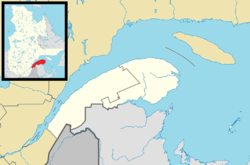Saint-Vianney
Saint-Vianney | |
|---|---|
 | |
 Location within La Matapédia RCM. | |
| Coordinates: 48°38′N 67°25′W / 48.633°N 67.417°W[1] | |
| Country | |
| Province | |
| Region | Bas-Saint-Laurent |
| RCM | La Matapédia |
| Settled | 1918 |
| Constituted | August 27, 1926 |
| Government | |
| • Mayor | Georges Guénard |
| • Federal riding | Avignon—La Mitis—Matane—Matapédia |
| • Prov. riding | Matane-Matapédia |
| Area | |
• Total | 145.00 km2 (55.98 sq mi) |
| • Land | 145.60 km2 (56.22 sq mi) |
| There is an apparent contradiction between two authoritative sources | |
| Population | |
• Total | 446 |
| • Density | 3.1/km2 (8/sq mi) |
| • Pop 2016-2021 | |
| • Dwellings | 245 |
| Time zone | UTC−5 (EST) |
| • Summer (DST) | UTC−4 (EDT) |
| Postal code(s) | |
| Area code(s) | 418 and 581 |
| Highways | |
| Website | www |
Saint-Vianney (French pronunciation: [sɛ̃ vjanɛ]) is a municipality in the Canadian province of Quebec, located in La Matapédia Regional Council Municipality. It was known as Saint-Jean-Baptiste-Vianney until 1988.
History
The first settlers arrived in 1918. In 1920, several Franco-American families settled in the territory. The Langis mission was founded in 1921. Its name recalls that of the canton of Langis of which Saint-Vianney is a part, named in honor of Louis-Jacques Langis who was parish priest of L'Isle-Verte and canon in the cathedral of Rimouski. The post office was opened on April 12, 1922. The first chapel was inaugurated on December 24, 1922. The municipality was officially founded on August 27, 1926 under the name Saint-Jean-Baptise-Vianney. The first mayor, Oscar Poulin, was elected on October 20, 1926. In 1988, Saint-Jean-Baptiste-Vianney changed its name to the current Saint-Vianney.[4]
Demographics
| 2021 | 2016 | 2011 | |
|---|---|---|---|
| Population | 446 (+1.1% from 2016) | 441 (-7.5% from 2011) | 477 (-2.5% from 2006) |
| Land area | 145.60 km2 (56.22 sq mi) | 145.99 km2 (56.37 sq mi) | 146.01 km2 (56.37 sq mi) |
| Population density | 3.1/km2 (8.0/sq mi) | 3/km2 (7.8/sq mi) | 3.3/km2 (8.5/sq mi) |
| Median age | 52.4 (M: 49.2, F: 54) | 51.2 (M: 47.2, F: 54.6) | 48.3 (M: 49.2, F: 47.5) |
| Private dwellings | 215 (total) | 239 (total) | 218 (total) |
| Median household income | $49,600 | $40,192 | $32,950 |
|
| |||||||||||||||||||||||||||||||||||||||||||||||||||||||||
| Source: Statistics Canada | ||||||||||||||||||||||||||||||||||||||||||||||||||||||||||
Private dwellings occupied by usual residents: 212 (total dwellings: 245)[3]
Mother tongue:
- English as first language: 0%
- French as first language: 100%
- English and French as first language: 0%
- Other as first language: 0%
Government
Municipal council
- Mayor: Georges Guénard
- Councillors: Jean-Pierre Beaupré, Cathy Santerre, Monique Blanchette, Robert Charest, Martin Guy Plourde, Geneviève Verreault
See also
References
- ^ "Banque de noms de lieux du Québec: Reference number 214838". toponymie.gouv.qc.ca (in French). Commission de toponymie du Québec.
- ^ a b "Saint-Vianney". Répertoire des municipalités (in French). Ministère des Affaires municipales, des Régions et de l'Occupation du territoire. Retrieved 2012-01-27.
- ^ a b c d "2021 Community Profiles". 2021 Canadian census. Statistics Canada. February 4, 2022. Retrieved 2022-04-27.
- ^ https://www.saint-vianney.net/ [bare URL]
- ^ "2016 Community Profiles". 2016 Canadian census. Statistics Canada. August 12, 2021. Retrieved 2022-11-10.
- ^ "2011 Community Profiles". 2011 Canadian census. Statistics Canada. March 21, 2019. Retrieved 2014-02-01.


